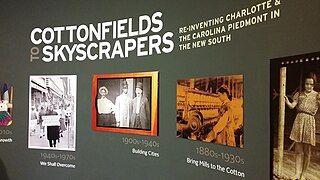Levine Museum of the New South
 Crowd gathers at the museum in 2010 | |
 | |
| Established | April 25, 1991 |
|---|---|
| Location | 401 South Tryon Street Charlotte, North Carolina |
| Coordinates | 35°13′28″N 80°50′48″W / 35.22444°N 80.84667°W |
| Type | Local history museum |
| Public transit access | |
The Levine Museum of the New South, is a history museum located in Charlotte, North Carolina whose exhibits explore issues relevant to the history of the greater Charlotte metro area and spark curiosity about our world today.[1] Founded in 1991 as the Museum of the New South, it was renamed after museum patron and Family Dollar founder Leon Levine in 2001.[2][3]
Overview
Originally opened in 2001 at Seventh and College streets, the museum's previous exhibit was called "Cotton Fields to Skyscrapers: Charlotte and the Carolina Piedmont in the New South", and featured period displays that reflected regional history. The displays included a one-room tenant farmer's house, a cotton mill and mill house, an African-American hospital, an early Belk department store, and a civil-rights era lunch counter. Changing exhibits focus on local culture, art and history.[4] “Cotton Fields to Skyscrapers,” the Levine’s flagship exhibition, has been preserved digitally. Most of the objects from that exhibit were on long-term loan and have been returned.[5]
In 2019, the museum had an exhibit "The Legacy of Lynching: Confronting Racial Terror in America", prepared in collaboration with the Equal Justice Initiative, who created the National Memorial for Peace and Justice.[6]
Relocation was considered in 2020 because the site had no room for expansion and was worth $7.7 million according to county records. The COVID-19 pandemic was one reason for considering more virtual options.[7] On June 16, 2021, the museum announced it would sell the downtown location and look for a new home. This news comes as the museum adds virtual activities such as the digital walking tour starting in August 2021. These changes come with the help of a $600,000 grant from the John S. and James L. Knight Foundation.[3]
In March 2022, the museum announced the sale of its building for $10.75 million to Vela Uptown LLC, which planned a high-rise apartment building. The museum closed in May to prepare for the move. The Museum is now open at 401 S. Tryon.in 6000 square feet in the Levine Center for the Arts at Three Wells Fargo Center, in space donated by Wells Fargo.[8]
Gallery
-
Entrance of Levine Museum of the New South
-
Welcome-Sign for President Roosevelt
-
Explanation-Sign
-
Model of Bank of America Corporate Center
-
Entrance of "Cottonfields to Skyscrapers"
-
Cotton-Machine
-
Model of plantation
References
- ^ i. “It’s a much smaller space and flexible, which is appropriate for us now as we experiment with new ways to develop and design exhibits. It will be a fluid space, changing all the time.”
- ^ "Levine Museum of the New South | NCpedia".
- ^ a b "Levine Museum of the New South selling uptown Charlotte facility, embarking on digital transformation". WBTV. June 16, 2021. Retrieved June 28, 2021.
- ^ [1]
- ^ https://www.charlotteobserver.com/news/business/development/article267895042.html “The museum is now open at a much smaller site on 401 S. Tryon St. as it pivots to shrinking its collection while expanding its digital presence.”
- ^ Arrowood, Maddy (May 31, 2019). "Exhibit traces legacy of lynching in North Carolina through the stories of victims". The Charlotte Observer.
- ^ Chemtob, Danielle (August 12, 2020). "Big changes for Levine Museum, as it weighs move and rethinks use of its uptown site". The Charlotte Observer.
- ^ https://www.charlotteobserver.com/news/business/development/article267895042.html “The museum is now open at a much smaller site on 401 S. Tryon St. as it pivots to shrinking its collection while expanding its digital presence.”








